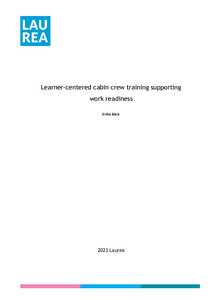Learner-centered cabin crew training supporting work readiness
Bäck, Erika (2023)
Bäck, Erika
2023
All rights reserved. This publication is copyrighted. You may download, display and print it for Your own personal use. Commercial use is prohibited.
Julkaisun pysyvä osoite on
https://urn.fi/URN:NBN:fi:amk-2023122239051
https://urn.fi/URN:NBN:fi:amk-2023122239051
Tiivistelmä
Learner-centered approach is a way of designing and delivering effective training. Needs, preferences, and goals of the learner are essential for employee training. A well-designed leaner-centric training offers numerous of benefits. Learner-centered training includes active involvement and self-direction of the learning process.
This thesis consists of the theoretical part, the implementation of the research and the results. This research examines the learner-centered cabin crew training supportiveness for the work readiness. The research defines the current state of the learner-centered Cabin Crew training, and it helps to find out whether the Cabin Crew training is as supportive for the work readiness as expected and valued by the learners. The target group for the research is the cabin crew members, employees, who received cabin crew training during the year 2023.
Research method is the SERVQUAL method. Results of the research are analyzed according to the SERVQUAL method and its calculation formula SQ=(Pi-Ei). SQ is the perceived service quality, Pi is the score factor of the experience and Ei is the score of the expectation. Negative gap score tell that the training quality is perceived poor, and the positive gap tell that service quality expectations are exceeded. According to the SERVQUAL model, the service provider must be able to provide five critical elements and these elements are environment, reliability, responsiveness, assurance, and empathy. These SERVQUAL dimensions support and guide the research.
This research was conducted by using a structured scale-based online survey which was sent to the respondents by e-mail in October 2023. 86 useful answers were received for this research.
The results of the study showed that the learners agreed that the learner-centered cabin crew training support the work readiness. Research results show the gaps between the expectations and the actual perceptions of the learners. In particular, feedback and communications were identified as an area for development. The tangible elements of the cabin crew training were valued by the learners. This research was conducted during the autumn 2023.
This thesis consists of the theoretical part, the implementation of the research and the results. This research examines the learner-centered cabin crew training supportiveness for the work readiness. The research defines the current state of the learner-centered Cabin Crew training, and it helps to find out whether the Cabin Crew training is as supportive for the work readiness as expected and valued by the learners. The target group for the research is the cabin crew members, employees, who received cabin crew training during the year 2023.
Research method is the SERVQUAL method. Results of the research are analyzed according to the SERVQUAL method and its calculation formula SQ=(Pi-Ei). SQ is the perceived service quality, Pi is the score factor of the experience and Ei is the score of the expectation. Negative gap score tell that the training quality is perceived poor, and the positive gap tell that service quality expectations are exceeded. According to the SERVQUAL model, the service provider must be able to provide five critical elements and these elements are environment, reliability, responsiveness, assurance, and empathy. These SERVQUAL dimensions support and guide the research.
This research was conducted by using a structured scale-based online survey which was sent to the respondents by e-mail in October 2023. 86 useful answers were received for this research.
The results of the study showed that the learners agreed that the learner-centered cabin crew training support the work readiness. Research results show the gaps between the expectations and the actual perceptions of the learners. In particular, feedback and communications were identified as an area for development. The tangible elements of the cabin crew training were valued by the learners. This research was conducted during the autumn 2023.
